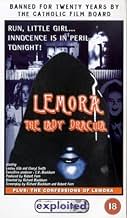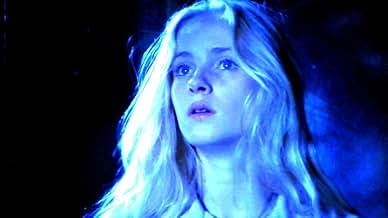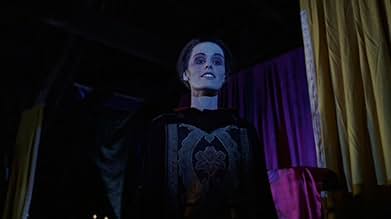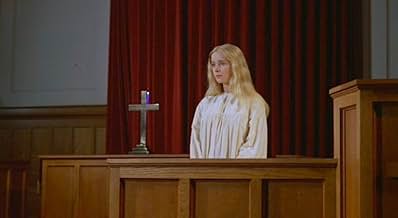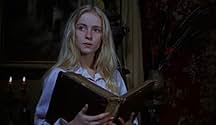NOTE IMDb
6,1/10
2,7 k
MA NOTE
Ajouter une intrigue dans votre langueA young girl who returns to her hometown to see her dying father finds herself being drawn into a web of vampirism and witchcraft.A young girl who returns to her hometown to see her dying father finds herself being drawn into a web of vampirism and witchcraft.A young girl who returns to her hometown to see her dying father finds herself being drawn into a web of vampirism and witchcraft.
- Réalisation
- Scénario
- Casting principal
Avis à la une
This is an unusual and enjoyable film that may have ambitions beyond it's means but is nevertheless a very brave attempt to do something just that little bit different. We begin with Cheryl Smith as the angelic, purer than pure, Lila Lee, star of the local church and living under the protection of her minister in the absence of her gangster father. Both here and later in the scenes with the magnificent lesbian vampire, Lemora, played by Lesley Taplin (Gilb) there are unmistakable hints that these older 'guardians' have more than the interests of the virgin child at heart. The opening scenes in the church and the later ones in Lemora's residence are colourful and rather grandly shot but it is the sequence depicting the young girl's seeming trip to find her father that is most astounding. From the moment she leaves the protection of the minister, she seems not only most vulnerable but the sets seem flimsy and almost laughable, but I'm guessing that this was deliberate and that even the bumpy creaky bus with the unbelievable driver are all designed to let us know that maybe not all is how it seems here. After this great sequence we meet the impressive Lemora and various zombies but despite a rather creepy bath scene there is just a little too much, running about. Still, unusual and well worth seeing.
6sol-
A dark, atmospheric little film, it is quite bizarre and intriguing to watch, with shadow enhancing lighting, flashy colours, great sets, and a fine lead performance by Cheryl Smith, who is a perfect choice to play an innocent uncorrupted. On the other hand, the writer-director gives off a somewhat restrained performance as a priest, and towards the end, the film heads off into rather messy territory, with excesses of horror and too many slow motion, plus it takes forever to wrap the story up. There are some interesting ideas at hand, and a few worthwhile production elements, but overall this is a film that is much more so interesting than it is great.
The late and sorely missed Cheryl Smith stars as Lila, the lovely pubescent daughter of a notorious gangster, who is being fostered by a kind-hearted minister. Unaware of her father's whereabouts and concerned for his well-being, she receives a letter indicating that he lays ailing in a mapped location, and should she choose to visit him, then she must do so alone. Thus begins Lila's dark odyssey...from the minute she steps away from the familiar safety of her front door, her nest of childhood innocence is given way to a bleak and frightening world fraught with drunks, strumpets, and lecherous men...but a corporeity of a far more uncanny and sinister nature awaits her at her journey's end...the mysterious letter she received was a siren-song luring her to the incommunicado home of Lemora, a vampiress with an appetence for the blood of youths. This ancient, statuesque creature resides with her cackling old charlady and a mottle of emaciated children in a dark swampland where savage ghouls prowl the night.
The bizarre nexus ensuingly forged between Lemora and Lila is simultaneously horrific and erotically charged...the small-framed, willowy Lila futilely resisting, though apprehensively drawn to, the imposing and mysterious Lemora. It's an arousing 'butch/femme' dynamic which works well, and is illustrated more intricately than most examples of the gratis lesbiana inclusive to vampire cinema.
An artfully executed celestial nightmare with subtexts touching on religious hypocrisy and elegiac loss of innocence, LEMORA demonstrates perfectly how integrity, creativity, and resourcefulness can compensate heartily for dearth of funds in a motion picture production.
Superior. 9/10.
The bizarre nexus ensuingly forged between Lemora and Lila is simultaneously horrific and erotically charged...the small-framed, willowy Lila futilely resisting, though apprehensively drawn to, the imposing and mysterious Lemora. It's an arousing 'butch/femme' dynamic which works well, and is illustrated more intricately than most examples of the gratis lesbiana inclusive to vampire cinema.
An artfully executed celestial nightmare with subtexts touching on religious hypocrisy and elegiac loss of innocence, LEMORA demonstrates perfectly how integrity, creativity, and resourcefulness can compensate heartily for dearth of funds in a motion picture production.
Superior. 9/10.
It isn't hard to see why 'Lemora' was condemned by the Catholic film society. It's the story of a pubescent girl's fall from innocence and her sexual awakening, told in a 'fairytale for adults' manner. There are some amoral scenes to sit through with hints of lesbianism between the child and her vampire tutor that occasionally come across as sleazy, especially when the pubescent girl is given a bath by Lemora ('What an exciting figure you have').
Ambitiously set in the 1920s, a gangster brutally murders his wife and her lover before disappearing into the country. His thirteen-year-old daughter, Lila Lee (played by Cheryl Smith*) is cared for by the Reverend Mueller (director, Blackburn), who secretly houses sensuous feeling for his little choirgirl. Lila is delighted when she receives a letter from the mysterious Lemora, detailing her father's deteriorating condition. Lemora demands that Lila be present at her father's bed immediately. Lila's journey to Lemora's hidden cottage, through dense dark woods is constantly plagued; firstly, by lecherous older men, then a psychopathic bus-driver and then a group of fanged beasts who chase her from the bus. The seductive Lemora's house is filled with children, all of whom are part of her growing legion of vampires. The Reverend has decided to admit his sordid desires to Lila and begins to search for her. You'd think that was enough plot development, but after this point more twists follow, which might confuse some viewers.
'Lemora', a late night TV favourite, is considered to be one of the classic vampire films of the early seventies, opposite 'Count Yorga, Vampire' (Bob Kelljan, 1970). There strong sexual overtones and the corruption of innocence storyline were the prime reasons why the Catholic Film Board wanted this film banned for almost twenty years. Due to its lack of budget, (poor sound and sketchy cinematography) and European feel, the film often looks like a porn film which doesn't help matters concerning the sexual connotations, but they're never really presented in a exploitative manner.
Ambitiously set in the 1920s, a gangster brutally murders his wife and her lover before disappearing into the country. His thirteen-year-old daughter, Lila Lee (played by Cheryl Smith*) is cared for by the Reverend Mueller (director, Blackburn), who secretly houses sensuous feeling for his little choirgirl. Lila is delighted when she receives a letter from the mysterious Lemora, detailing her father's deteriorating condition. Lemora demands that Lila be present at her father's bed immediately. Lila's journey to Lemora's hidden cottage, through dense dark woods is constantly plagued; firstly, by lecherous older men, then a psychopathic bus-driver and then a group of fanged beasts who chase her from the bus. The seductive Lemora's house is filled with children, all of whom are part of her growing legion of vampires. The Reverend has decided to admit his sordid desires to Lila and begins to search for her. You'd think that was enough plot development, but after this point more twists follow, which might confuse some viewers.
'Lemora', a late night TV favourite, is considered to be one of the classic vampire films of the early seventies, opposite 'Count Yorga, Vampire' (Bob Kelljan, 1970). There strong sexual overtones and the corruption of innocence storyline were the prime reasons why the Catholic Film Board wanted this film banned for almost twenty years. Due to its lack of budget, (poor sound and sketchy cinematography) and European feel, the film often looks like a porn film which doesn't help matters concerning the sexual connotations, but they're never really presented in a exploitative manner.
This highlight of seventies horror cinema is a vibrant and lush Gothic fairytale story of a young girl's odyssey as she searches for her father in a world of vampires and demons that wont hesitate to take her innocence at any opportunity that they get. Richard Blackburn's film takes influence from a number of sources across both film and literature, but in spite of this; the writer-director has managed to mould together a tale that is both haunting and original. The story follows Lila Lee, the daughter of a notorious gangster who, after finding his wife in bed with another man, proceeds in blowing both her and her lover to bits. Shortly after her father had fled the town to avoid the law, Lila Lee receives a letter telling her that her father is on his deathbed and wants her to come and see him. Only thing is, this letter is signed 'Lemora'. The film plays out like an offbeat coming of age drama, with the innocent young Lila Lee learning that all is not as it seems, and that danger lurks around every corner. The supernatural elements serve brilliantly as a metaphor for the similar dangers in real life.
The acting in Lemora clearly isn't the most important aspect of the film, but there are still some notable performances on display. Cheryl Smith takes the lead role as the angelic Lila Lee, and completely looks the part as a bewildered young girl in the centre of a world she knows nothing about. The title role of 'Lemora' is taken by Lesley Gilb. This actress doesn't have a film credit to her name after this film, and it's not really surprising as despite looking the part; her performance is wooden in the extreme. Writer-director Richard Blackburn is surprisingly effective in his small role as a reverend. He completely convinces as the odd god fearing preacher. Really, though, it's the more aesthetic elements of the film that rule; and the atmosphere and the make-up are absolutely excellent. The nighttime filming helps to create a sense of danger at every turn, and brilliantly compliments the fear that the child at the centre of the story is feeling. The make-up is effectively done, but not overdone; which makes the monsters feel very real despite their otherwise otherworldly appearance. Lemora, despite it's low budget and inexperienced crew, is a surprisingly professionally done film. While most films released at this point in time relied on high body counts and gore levels to draw audiences; Richard Blackburn has put the focus on story and atmosphere, and that is why Lemora is the enduring, albeit lost, classic that it is today.
The acting in Lemora clearly isn't the most important aspect of the film, but there are still some notable performances on display. Cheryl Smith takes the lead role as the angelic Lila Lee, and completely looks the part as a bewildered young girl in the centre of a world she knows nothing about. The title role of 'Lemora' is taken by Lesley Gilb. This actress doesn't have a film credit to her name after this film, and it's not really surprising as despite looking the part; her performance is wooden in the extreme. Writer-director Richard Blackburn is surprisingly effective in his small role as a reverend. He completely convinces as the odd god fearing preacher. Really, though, it's the more aesthetic elements of the film that rule; and the atmosphere and the make-up are absolutely excellent. The nighttime filming helps to create a sense of danger at every turn, and brilliantly compliments the fear that the child at the centre of the story is feeling. The make-up is effectively done, but not overdone; which makes the monsters feel very real despite their otherwise otherworldly appearance. Lemora, despite it's low budget and inexperienced crew, is a surprisingly professionally done film. While most films released at this point in time relied on high body counts and gore levels to draw audiences; Richard Blackburn has put the focus on story and atmosphere, and that is why Lemora is the enduring, albeit lost, classic that it is today.
Le saviez-vous
- AnecdotesNotably similar to the story Carmilla by Sheridan Le Fanu in which a female seduces a teenage girl. Towards the end of the film Lemora indicates that she has had many names.
- GaffesWhen Lila is first taken into the house by Lemora, she is told to go upstairs to her room. Lemora says "It is the first open door at the end of the hall." But when Lila goes upstairs ALL of the doors are closed.
- ConnexionsFeatured in Movie Macabre: Lemora A Child's Tale of the Supernatural (1983)
- Bandes originalesPaper Angel
Sung by The Black Whole
Meilleurs choix
Connectez-vous pour évaluer et suivre la liste de favoris afin de recevoir des recommandations personnalisées
- How long is Lemora: A Child's Tale of the Supernatural?Alimenté par Alexa
Détails
- Date de sortie
- Pays d’origine
- Langue
- Aussi connu sous le nom de
- Lemora: A Child's Tale of the Supernatural
- Lieux de tournage
- Phillips Mansion - 2640 W. Pomona Boulevard, Pomona, Californie, États-Unis(Lemora's house exteriors)
- Société de production
- Voir plus de crédits d'entreprise sur IMDbPro
Contribuer à cette page
Suggérer une modification ou ajouter du contenu manquant



